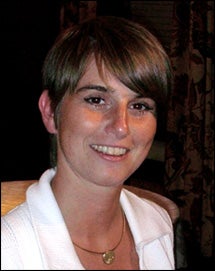Post-doctoral fellow earns Young Investigator Grant
A young researcher at the University of Colorado Cancer Center believes she could find a simple, noninvasive test that would diagnose lung cancer in its very earliest stages or even while it's still pre-cancerous.
Celine Mascaux, M.D, Ph.D., a post-doctoral fellow at the University of Colorado Cancer Center, has identified several molecular changes in patients with the earliest stages of lung cancer. She also has found that these markers differ between smokers and nonsmokers as well as between men and women. Most importantly, she has found biomarkers that indicate the presence of lesions at low risk of turning cancerous from those that were at high risk or were already invasive cancer.
Mascaux is now testing a much larger number of patients from the United States and Belgium to verify her findings. She hopes that she could find the same molecules in patients' sputum or blood, which could lead to the development of a simple, noninvasive screening test to detect lung cancer in its earliest stages.
In recognition of her work, Mascaux was named a winner of the prestigious National Lung Cancer Partnership Young Investigator Grant. Mascaux, 36, is one of just six young researchers worldwide to receive this award.
"This award will help bring attention to my work that will attract others to collaborate," says Mascaux, who won an International Association for the Study of Lung Cancer Fellowship Award in 2009 to come to Colorado.
Lung cancer is the most deadly form of cancer, killing more people each year than breast, prostate and colon cancers combined. Currently, there are no general screenings that can detect lung cancer at its earliest stages. Lung cancer patients generally have only a 15 percent chance of surviving five years, compared with a 60 percent to 80 percent five-year survival rate for patients whose cancers can be surgically removed at an early stage.


